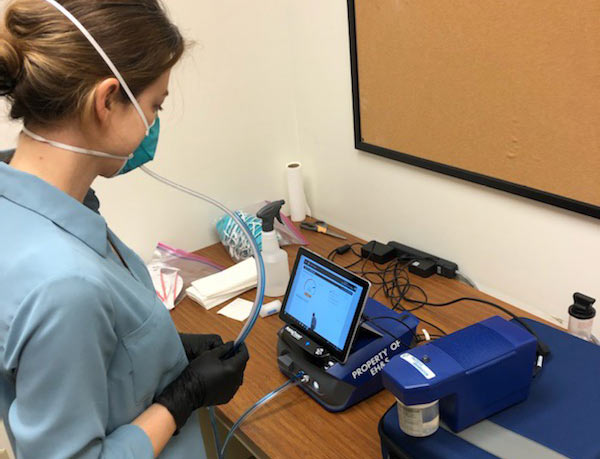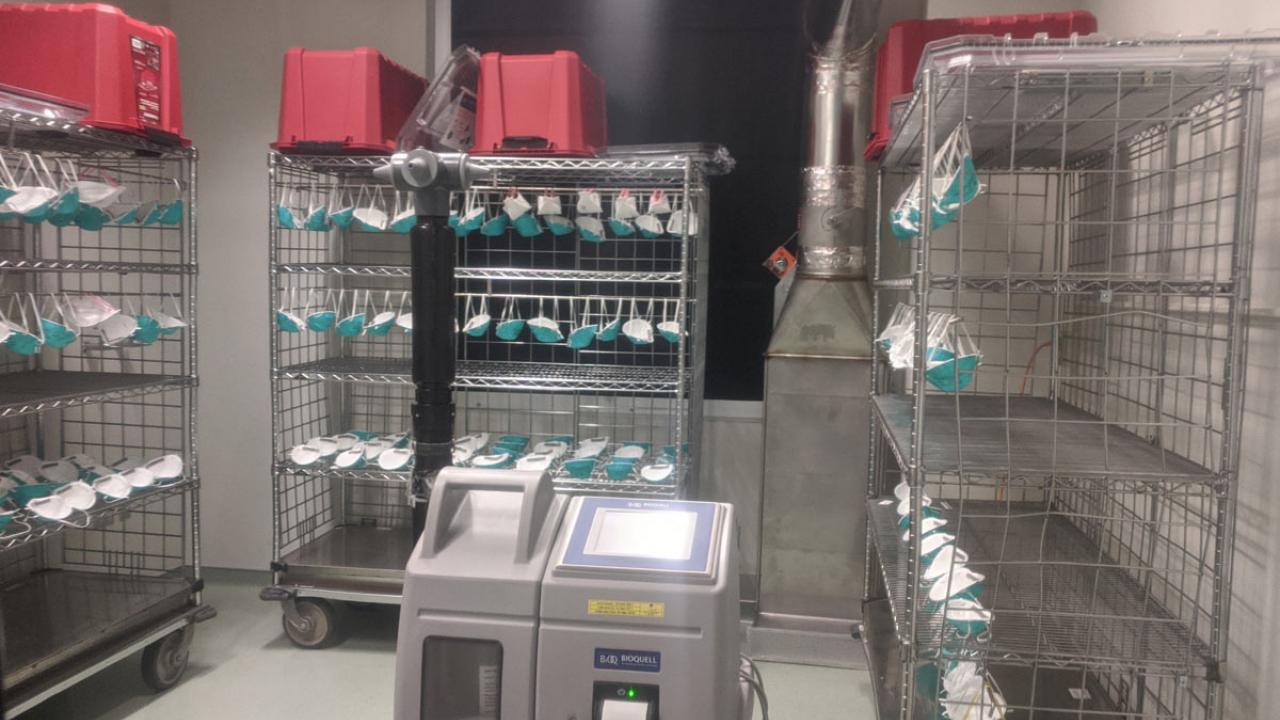Quick Summary
- UC Davis Health is assessing the integrity, performance of the respirator masks after they are decontaminated
- The goal is to establish a backup supply in the face of high demand during the coronavirus pandemic
- 2 more days of testing on the Davis campus, followed by 12 days on the Sacramento campus
The Sacramento region has been very fortunate, so far, in avoiding COVID-19 infection rates nearly as high as those that have hit other areas of the country and world.
Even so, UC Davis Health is determined to remain fully prepared should there be a rise in the number of infections from the new coronavirus, again threatening the health and safety of the community. This preparation includes using a well-established decontamination process to create an inventory of backup N95 respirator masks for clinical care teams and other employees.
None of the masks has been deployed, however, pending an assessment of their integrity and performance after decontamination. Volunteers, including students, are being sought for fit-testing on the Davis and Sacramento campuses. See below for information on how to sign up.
Vaporized hydrogen peroxide
UC Davis Health is decontaminating the masks with vaporized hydrogen peroxide, in a process used for years in other industries to sterilize other equipment.
Laboratory testing has validated the safety of the vaporizing method, demonstrating that N95s still met performance requirements even after being decontaminated 50 times. A Duke University study earlier this year confirmed the method and provided a protocol for health providers like UC Davis Health to further ensure safety.
UC Davis experts recently established a vaporizing chamber on the Sacramento campus, and the chamber at this time is processing about 300 masks a day. Eventually, the process could provide up to 1,000 safe, reusable respirators per day as emergency backups.

The testing
About 100 volunteers are needed to help confirm the N95s protective seals are not compromised by multiple uses and decontaminations. (Of course, the masks will be decontaminated again before being added to the backup supply.)
Note: Volunteers must be cleanshaven and makeup-free in order to ensure a proper seal for the masks.
Elizabeth Ingham, safety officer with the School of Medicine, Sacramento campus, described the testing: A volunteer puts on a mask that is connected via tubing to a PortaCount fit-tester, then performs a series of moving, breathing and talking exercises. At the same time, a nebulizer emits a mist of sodium chloride microparticles in saline solution (all completely nonhazardous) into the room, and the PortaCount monitors the concentration of those microparticles outside the mask (in the ambient air) and inside the mask (that is, the leakage), to produce a quantitative report on the mask’s fit on the face.
“This system provides a very fast, easy and OSHA-compliant fit-test method, so that we can validate that the functional integrity of the masks we've decontaminated via the VHP [vaporized hydrogen peroxide] sterilization method is maintained,” Ingham said.
Signing up
The testing has been divided into two-hour blocks, during which time each volunteer would be asked to complete approximately 15 quantitative fit tests.
The schedule started this week with four days on the Davis campus, through Friday (May 29). There is one time slot each day: 8-10 a.m.
After that, the testing moves to the Sacramento campus for 12 days, Tuesday through Friday for three weeks:
- Tuesdays, Wednesdays and Thursdays, June 2-4, 9-11 and 16-18 — Four time slots available each day, 8-10 a.m., 10:15 a.m.-12:15 p.m., 12:45-2:45 p.m. and 3-5 p.m.
- Fridays, June 5, 12 and 19 — Two time slots are available each day, 8-10 a.m. and 10:15 a.m.-12:15 p.m.
Use this Doodle poll to indicate when you can volunteer. The form asks only for your name, but organizers ask volunteers to also include email address.
To maintain physical distancing, only two volunteers per two-hour slot will be scheduled for the fit-testing.
For more information, contact safety officer Ingham by email.
Media Resources
Dateline Staff, 530-752-6556, dateline@ucdavis.edu
